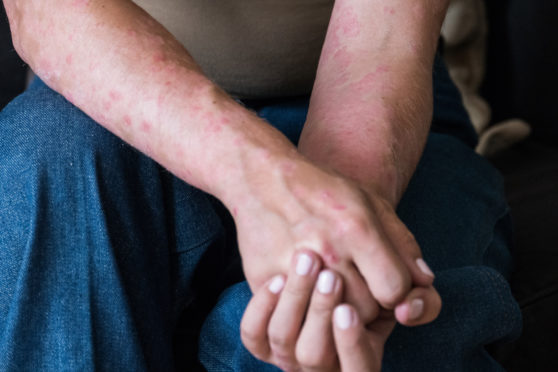With the best will in the world, the annual conference of the Royal College of General Practitioners can be a dry affair.
But on this occasion, a stunning performance poem drew me off from the coffee and shortbread break and proceeded to blow me away.
It was titled Psoriasis – The Skin I’m In. Performed by two actors and accompanied by haunting music from a cello and a clarinet, the poem used direct quotes from people who suffered from the condition, recounting their actual lived experiences, their daily pain, humiliation and discomfort.
And as a psoriasis sufferer myself, I felt they were speaking directly to my heart.
My skin rash started out of the blue 20 years ago, following a sickness bug. Initially I did what I usually do and ignored it. But within 24 hours the annoying rash had morphed into livid pink thumbprints that covered every inch of my body.
Turning a blind eye was no longer an option so I did what we all do and Googled myself into a frenzy of impending doom before admitting it was time to make an appointment with my own GP for a spot of objective help.
I was diagnosed with Guttate Psoriasis, a form of the condition that can occur after a bacterial throat infection. It usually resolves, but about a third of sufferers continue to have the more persistent Chronic Plaque Psoriasis and others have recurrences with further infections and complications. “Guttate” is derived from the Latin word gutta, meaning drop. This described my skin perfectly as the oval, dark pink skin lesions which covered my body made me look like I’d been been splattered with paint.
Each spot was rough, dry and itchy. Silvery flakes constantly formed and shed. I grew more and more uncomfortable. My inflamed skin gave off a fiery heat and I never seemed to be able to control my body temperature. It was exhausting. Bathing dried my skin further and gave no relief. Each morning my sheets were scattered with the “grated cheese” of skin flakes and bloodstained from over-vigorous scratching. Treatment involved sedating antihistamines and greasy creams which smelt of tar and made my clothing stick to my body. It was highly unpleasant.
Married and with a young family, I had never really been concerned much with my appearance; even teenage acne had only felt like a minor inconvenience. But now I really felt unattractive, I was amazed that Erica had not banished me to the spare room – how could she not mind the tar smell, the sheets, the flakes?
Psoriasis is highly visible. In public I was acutely aware of those second glances. I had to steel myself to visit the swimming pool with the kids and face down people’s alarm. I’m your GP! I wouldn’t be here if I was contagious!
Honestly, if I couldn’t live normally what must it be like for others?
My patients seemed unnerved too, many quipped about how I ought to be able to do something about it – Physician, heal thyself – only I couldn’t.
The turning point came when my appointment with the dermatologist came through. She took time to hear my story. She reviewed the facts and then, finally, asked how this was affecting me. She got it. This was about more than the disease; this was about being ill.
A rush of words came out as I tried to describe how much I was struggling, exhausted and uncomfortable but still trying to soldier on like some sort of superhero. She listened and understood, made a strong recommendation I take a week’s sick leave, adjusted my medicines and booked me in for phototherapy.
I returned to work in far better shape. I had accepted what was happening to my skin. What’s more there was clear evidence that my psoriasis was fading and I would be one of the fortunate ones for whom it would be a short-lived episode. I popped across the carpark in my coffee breaks for my phototherapy at our local hospital. I started to forget to apply the creams but still, the raised dry patches became pale pink areas that slowly faded away.
Since that episode I have had another minor flare up but otherwise, apart from a scaly scalp and the odd spot, my skin has remained clear. Of course I continue to see patients with psoriasis and other skin complaints and I hope I have a clear understanding of their situation. Treatments are improving; they’re less messy and more effective and the phototherapy is more advanced, with less risk of side effects.
Listening to that wonderful poem, I wanted to shout out to everyone in the room to listen – properly – too. The performers were telling my story and the story of many, many others. However clever we are as doctors in healing disease, we also need to be able to manage illness, and that is a far more human endeavour.
Psoriasis – The Skin I’m In
The See Psoriasis Look Deeper Campaign
http://www.seepsoriasislookdeeper.co.uk/
Dr Miles Mack is a GP in the Highlands and the former chair of the Royal College of General Practitioners Scotland

